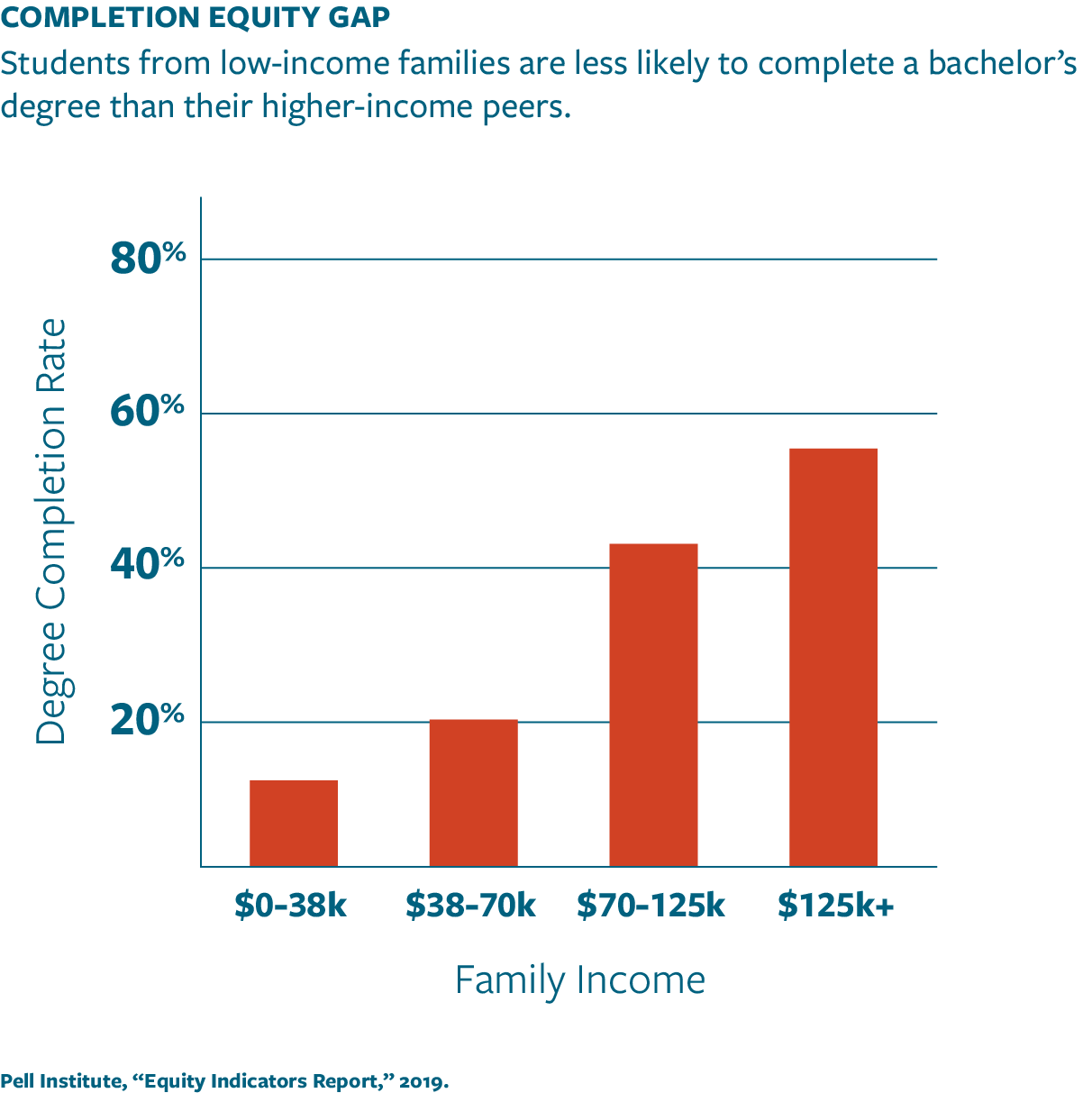
How We See the Problem
Today’s learners often aren’t well served by the educational systems that were built years ago for more traditional students. Now students are often older, more diverse, working one or more jobs, raising families, and struggling to make ends meet.
Colleges and universities are complex, and often don’t have a student-centric approach to course offerings or availability, advising and other institutional policies. The problem shows in the equity gaps in completion rates: just 11% of low-income students graduate with a bachelor’s degree. Almost 6 times as many students — 58% overall — from higher-income households graduate.

Our Three Investment Priorities
Grants to Remove Structural Barriers to Success
Capitalizing on Federal Momentum to Advance Postsecondary Student Success
Exploration
This grant supports a project by MDRC, SHEEO and The Education Trust in capitalizing on momentum created by several federal proposals to provide funding for college student success programs. The effort will equip states and colleges with guidance and technical assistance so that they prioritize the implementation of programs with the strongest evidence base.
Scaling the Student Success Center Network Coaching Program
Scaling
This grant supports Jobs for the Future in building the capacity of four Student Success Centers to deploy coaches trained in advancing reforms at colleges in their states. The project provides capacity-building seed grants and strategic technical assistance to Centers in designing and implementing in-state coaching programs, while also providing training and ongoing professional development to the cadre of coaches.
Bringing to Scale and Measuring the Effects of Guided Pathways Reforms by Ohio’s Community Colleges
Validation
This grant supports the Community College Research Center at Teachers College, Columbia University in studying and disseminating learnings from the implementation of guided pathways reforms at Ohio’s public two-year institutions.
Building Capacity Across Illinois to Scale Corequisite Supports
Exploration
This grant supports the Partnership for College Completion, in collaboration with the Illinois Community College Board, in building the capacity of Illinois colleges to adopt corequisite models of developmental education redesign. This project will create faculty-driven measures of quality that will inform statewide implementation of evidence-based reforms.
Strong Start to Finish Implementation & Innovation Fund
Scaling
This grant supports Education Commission of the States (ECS) in amplifying the impact and reach of Strong Start to Finish (SSTF), a national developmental education initiative funded by Ascendium since 2016. The unique pooled funding approach makes it possible for SSTF to work at scale in six state systems; a supplemental investment would allow ECS to provide technical assistance to those state systems around emergent needs and advise other state systems eager to replicate their success.
Guided Pathways Implementation in Iowa’s Community Colleges
Scaling
This grant supports the Iowa Department of Education in implementing a set of systemic guided pathways reforms that will improve student outcomes and reduce equity gaps.
Cataloguing and Understanding the Origins and Intents of Administrative Holds
Exploration
This grant supports Education Commission of the States in exploring the origins of administrative holds and understanding the role state, postsecondary system and institutional policies have in authorizing the practice of levying administrative holds.
Improving Student Success through Holistic Student Support Redesign
Scaling
This grant supports Arkansas Community Colleges in creating thoughtful and sustainable changes to the student advising systems so that students are better served academically and are supported on their paths to completing a postsecondary credential.
Caring Campus
Exploration
This grant supports the Institute for Evidence-Based Change in cultivating caring campus environments to increase student retention. The project seeks to produce an adaptable framework for including campus staff in student success reform efforts.
Multiple Measures Assessment Phase II
Validation
This grant supports MDRC in evaluating whether the use of multiple measures assessment to determine student readiness for college-level math increases successful completion of gateway college math courses.


